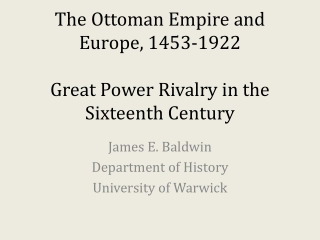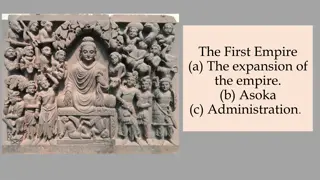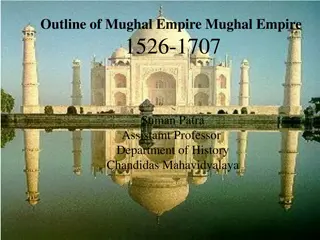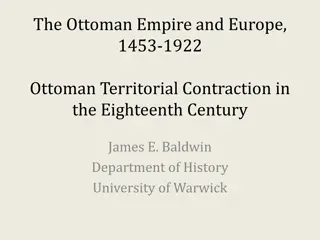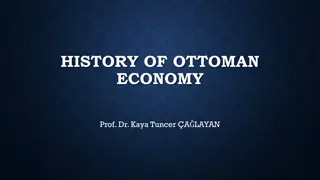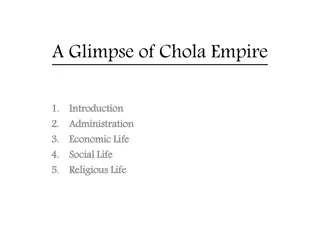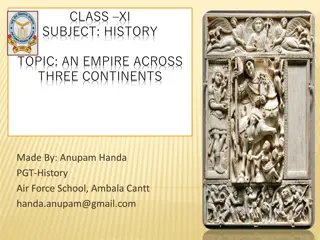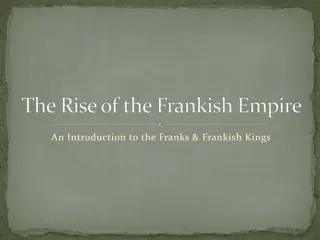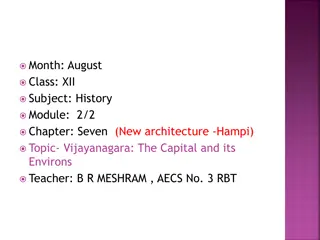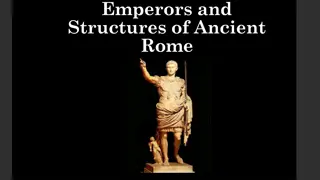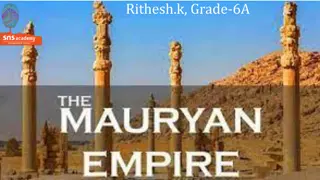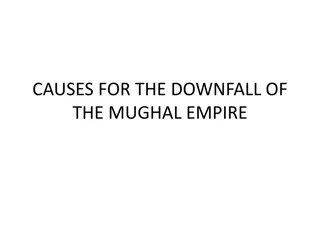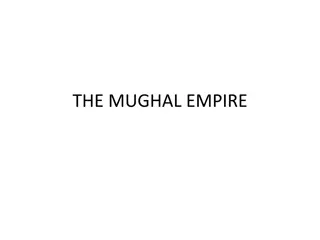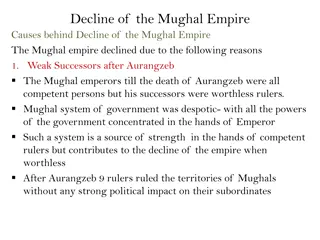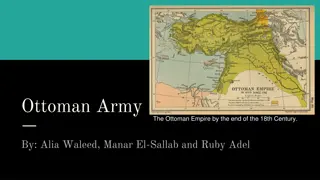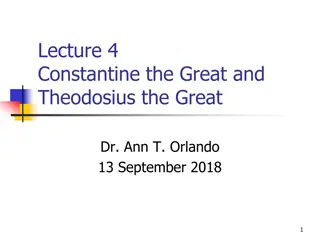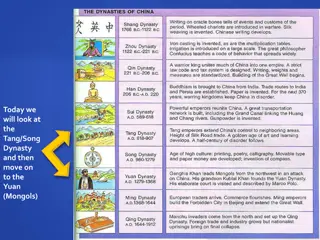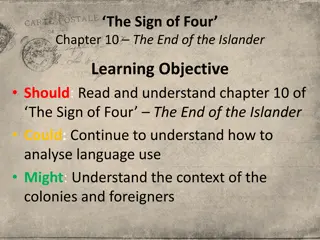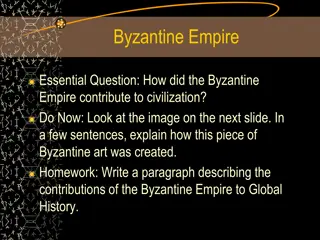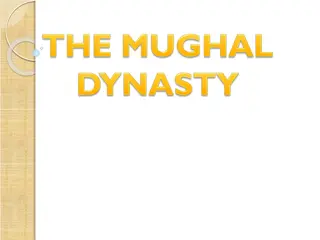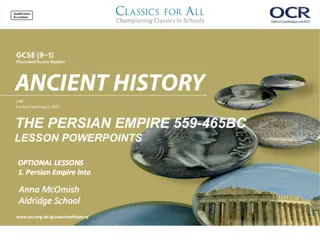The Ottoman Empire and Europe, 1453-1922
The interaction between the Ottoman Empire and European powers, including the Habsburgs, Safavids, Mamluks, and Russia, shaped the geopolitical landscape of the 16th century. This period saw Ottoman expansion, clashes between different empires, and complex motivations behind territorial conquests, i
0 views • 16 slides
Reform Efforts in the Ottoman Empire: 18th and 19th Century Transformations
The Ottoman Empire underwent a series of reforms from the late 18th to the 19th century, aiming to centralize power, boost revenues, strengthen the military, educate bureaucrats, refine legal systems, and improve healthcare. Factors driving these reforms included military weaknesses, separatist nati
0 views • 19 slides
Mauryan Empire: Expansion, Administration, and Legacy of Ashoka
The Mauryan Empire, ruled by Chandragupta, Bindusara, and the renowned Ashoka, witnessed significant expansion and innovative administration methods. Through taxation, infrastructure development, and royal appointments, the empire flourished. Ashoka's reign marked a shift towards peace, public welfa
4 views • 7 slides
Outline of Mughal Empire Mughal Empire 1526-1707.
The Mughal Empire in India from 1526 to 1707 was a significant period marked by notable rulers such as Babur, Humayun, Akbar, Jehangir, Shah Jehan, and Aurangzeb. These emperors each contributed differently to the empire's development, with highlights including military conquests, administrative ref
7 views • 14 slides
The Pala Empire: Rise and Patronage of Buddhism
The Pala Empire, known for its significant expansion and patronage of Mahayana Buddhism, saw key rulers like Gopala, Dharmapala, and Devapala leading to a cultural flourishing with establishments like Vikramashila and Nalanda universities. Noted Buddhist scholars from this period include Atisha and
2 views • 15 slides
Understanding Empire High School's New Accountability System
Explore Empire High School's journey with the Comprehensive Support and Improvement (CSI) School identification under the new accountability system. Delve into reasons for the system, New York's indicators for school performance, the Every Student Succeeds Act (ESSA) impact, educational equity, and
1 views • 23 slides
Ottoman Empire Territorial Contraction in the 18th Century
Ottoman Empire faced agricultural and fiscal crises in the 17th century, leading to internal rebellions. However, by the mid-17th century, the empire had recovered and experienced further expansion, albeit at a slower rate compared to the previous century. In the 18th century, the Ottomans suffered
2 views • 12 slides
If you are looking for Event Space in Rosanna
If you are looking for Event Space in Rosanna, Welcome to Studio 52 \/ Empire Music Studios, Melbourne's premier recording experience and music venue located in Heidelberg West. With a rich history spanning almost 40 years, we offer world-class music recording studios and a live music venue that pro
0 views • 6 slides
If you are looking for Music Studio in Rosanna
If you are looking for Music Studio in Rosanna, Welcome to Studio 52 \/ Empire Music Studios, Melbourne's premier recording experience and music venue located in Heidelberg West. With a rich history spanning almost 40 years, we offer world-class music recording studios and a live music venue that pr
2 views • 6 slides
Understanding the Growth of the Songhai Empire
Delve into the factors that fueled the growth of the Songhai Empire in West Africa for nearly 150 years. Explore the key reasons behind its rise to power and the significance of its dominance in the region. Work collaboratively to uncover evidence supporting the various factors that contributed to t
1 views • 6 slides
Writing an Evidence-Based Claim in History: Unraveling the Gupta Empire's Legacy
Delve into the art of crafting an evidence-based claim by exploring the historical context of the Gupta Empire. Understand the significance of formulating a well-supported thesis statement and backing it up with thorough evidence analysis, particularly focusing on the empire's achievements in mathem
0 views • 5 slides
Sub-Saharan Kingdoms of Ghana and Mali: Rise and Fall
The Sub-Saharan Kingdoms of Ghana and Mali were powerful empires in Western Africa, known for their wealth in gold and salt trade. Ghana emerged in 500 A.D. as the first great traders in West Africa, with strong rulers and a well-trained army. The empire of Ghana controlled all gold trade and had a
2 views • 17 slides
The Fascinating Business Empire of Elon Musk
Elon Musk, the iconic tech titan, leads a diverse business empire encompassing companies like SpaceX, Tesla, and more. His visionary goals and controversial style have shaped industries from aerospace to neurotechnology. Despite hype surrounding his ambitious promises, Musk's influence continues to
1 views • 13 slides
Overview of the Ottoman Empire's Economy and Social Structure
The history of the Ottoman Empire's economy and social structure encompasses its Turkish and Islamic influences, as well as its geographical diversity across regions like Asiatic, East European, and African territories. The empire's centuries-long existence from 1300 to 1918 saw distinct periods of
3 views • 105 slides
A Glimpse of Chola Empire: Rise and Fall of an Ancient Dynasty
The Chola Empire, under rulers like Vijayalaya, Aditya I, and Rajaraja I, witnessed periods of expansion, conquests, and cultural advancements. Their efficient administration, economic prosperity, social structure, and religious practices are discussed, highlighting the empire's zenith under Arumoli
0 views • 11 slides
An Empire Across Three Continents - A Historical Journey
Explore the fascinating history of an empire spanning three continents, from the rise of trade networks in the Assyrian empire to Alexander the Great's conquests and the evolution of Rome into a dominant power. Discover the shared cultures, languages, and sources that illuminate the rich past of the
1 views • 34 slides
The Rise of the Frankish Empire: A Journey Through History
Explore the fascinating history of the Frankish Empire from the conquest of Gaul by the Franks in the 5th century to the reign of Charlemagne as the Holy Roman Emperor. Discover key events such as Clovis I's unification of the Franks, Charles Martel's victory at the Battle of Tours, and Charlemagne'
4 views • 6 slides
Vijayanagara: The Glorious Capital of the Vijayanagara Empire
Vijayanagara, the capital of the Vijayanagara Empire, was established by Harihara and Bukka in 1336 on the banks of the river Tungabhadra. Known as Hampi, the city flourished under Krishnadeva Raya, boasting unique architectural styles, sophisticated water management systems, impressive fortificatio
0 views • 17 slides
Building a Business Empire: Insights from Dr. Thomson Frank Mpinganjira, CEO of FDH Financial Holdings Limited
Dr. Thomson Frank Mpinganjira, the Group Chief Executive Officer of FDH Financial Holdings Limited, shares his journey in building a successful business empire, including overcoming hurdles, setting up financial institutions, and principles of business growth. His experiences aim to inspire entrepre
0 views • 56 slides
Societal Organization and Administration in Chola Empire
The Chola Empire during the 9th to 10th centuries introduced social reforms, established a structured administrative system from provinces to villages, emphasized village administration, promoted temple construction and Brahmin settlements, and integrated temples into society, providing employment a
0 views • 15 slides
Discovering the Rich History of Hampi: A Glimpse into the Vijayanagara Empire
Hampi, also known as Vijayanagara, holds the remnants of a once grand empire founded in the 14th century. The discovery of this historical site in 1800 by Colonel Colin Mackenzie marked the beginning of unveiling its treasures. From its origins under Harihara I and Bukka I to the golden era under Kr
0 views • 18 slides
Notable Emperors and Structures of Ancient Rome
Julius Caesar, Augustus Caesar, Hadrian, Marcus Aurelius, Diocletian, and Caligula were significant figures in ancient Rome, each with their own contributions and characteristics. From Julius Caesar's military prowess to Augustus Caesar's establishment of the Roman Empire, and Hadrian's emphasis on
0 views • 11 slides
Hinduism Flourishing in the Pandyan Empire
Hinduism flourished during the period of the Pandyan Empire, with rulers giving extensive donations to Saiva and Vaishnava temples. They provided endowments for temple renovation and maintenance. Notable rulers like Maravarman Sundara Pandyan and Jatavarman Sundara Pandiya contributed significantly
0 views • 18 slides
Overview of Mauryan Empire: Chandragupta, Bindusara, and Ashoka
Mauryan Empire, established by the Mauryas, was the first major empire in India, encompassing a vast territory and surpassing previous dynasties in land control. Chandragupta Maurya, Bindusara, and Ashoka were key emperors who shaped the empire's history. Chandragupta, supported by Chanakya, conquer
0 views • 13 slides
Religious Influence of Nayaks Dynasties in South India
Nayaks Dynasties emerged after the downfall of the Vijayanagara Empire, with Nayak rulers patronizing Hindu religion, promoting Saivism and Vaishnavism, and supporting religious activities. They contributed to the growth of Linga worship, celebrated various festivals, and facilitated the development
0 views • 13 slides
The Impact of the British Empire on Scotland: Lessons and Reflections
Exploring the historical significance of the British Empire on Scotland, this lesson delves into the interconnections between the two entities. It examines various aspects such as population movements, cultural investments, economic influences, and the overall positive impact on Scotland. By investi
0 views • 12 slides
Causes for the Downfall of the Mughal Empire
The decline of the Mughal Empire post-Aurangzeb's reign was due to factors such as religious persecution, the Deccan policies, weak successors, financial difficulties, neglect of sea power, European settlement, and invasions. These political, social, and economic issues contributed to the downfall o
0 views • 9 slides
The Mughal Empire: History and Legacy
The Mughal Empire was founded by Babur, a skilled statesman and conqueror. His military conquests paved the way for the empire's expansion in India. Babur's son Humayun faced challenges during his reign, leading to a period of instability. Despite difficulties, the Mughal Empire left a lasting impac
0 views • 13 slides
Causes Behind the Decline of the Mughal Empire
The decline of the Mughal Empire was influenced by weak successors after Aurangzeb, degeneration of Mughal nobility, inefficiency of the army, economic bankruptcy, foreign invasions, wars of succession, and court factions. The empire faced challenges such as incompetent rulers, weakened military, fi
2 views • 5 slides
Rise and Fall of the Ottoman Empire's Military Power in the 18th Century
The Ottoman Empire's military success in the 18th century was attributed to their expertise in using gunpowder, loyal soldiers, strong organization, multilingual education, and strategic planning. However, the empire faced decline due to dated cultural practices and increasing European power, leadin
1 views • 17 slides
The Transformation of the Roman Empire: Constantine and Theodosius
The lecture delves into the significant reigns of Constantine the Great and Theodosius the Great in the context of the Roman Empire's historical changes. It explores the social and ecclesial impact brought about by Constantine's policies and examines the political landscape during the early fourth c
0 views • 29 slides
Rise and Legacy of the Mongol Empire
The rise of the Mongol Empire under Genghis Khan, the unification of Mongols, conquests, and the establishment of the Yuan Dynasty by Kublai Khan are highlighted. The Mongols' military prowess, organizational skills, and cultural adaptability led to the largest land empire in history. The Pax Mongol
0 views • 11 slides
Impact of British Empire and Commonwealth on Migration: Unpacking Immigration Stories
Explore the historical impact of the British Empire and Commonwealth on British migration through six immigration stories. Understand how relations with former colonies have shaped diversity in Britain and influenced British immigration patterns. Key terms like migration, emigration, empire, and col
0 views • 23 slides
Achievements of the Gupta Empire in India
The Gupta Empire in India flourished during its Golden Age, marked by peace, prosperity, and significant advancements in science, mathematics, astronomy, and medicine. Led by rulers like Chandra Gupta II, the empire fostered trade, innovation, and cultural exchange, influencing the spread of Indian
0 views • 9 slides
Colonial Influences and The British Empire
The British Empire once ruled over vast territories, including parts of North America, India, and Africa. European countries colonized other nations to expand trade and acquire resources. Colonization ceased in the 20th century due to moral objections and independence movements in colonies. The spre
0 views • 15 slides
The Contributions of the Byzantine Empire to Civilization
The Byzantine Empire made significant contributions to civilization through art, law, religion, and centralization of government. The empire's legacy includes the preservation of Roman laws, promotion of Christianity, accumulation of church wealth, and establishment of Constantinople as a key center
0 views • 22 slides
Overview of the Mughal Empire and Its Great Mughals
The Mughal Empire was a significant imperial power in the Indian subcontinent from 1526 to 1757, ruled by Muslim descendants of Genghis Khan. The empire extended over a vast region and produced six great Mughal rulers: Babur, Humayun, Akbar, Jahangir, Shah Jahan, and Aurangzeb. Babur was the founder
0 views • 14 slides
Exploring the Ancient Persian Empire: Lessons and Tasks
Delve into the intriguing history of the Persian Empire with lessons focusing on its geography, rivals, and ruling dynamics. Engage in tasks such as chronological order puzzles, map analysis, and discussions on empire-building qualities. Uncover the complexities of the Middle East in 600 BC and the
0 views • 9 slides
The Byzantine Empire: Society, Achievements, and Decline
The Byzantine Empire, established in 527 A.C, was marked by religious conflicts and military advancements. The society was patriarchal, centered around Christianity, and had a hierarchical structure. The empire made significant progress in weaponry and trade, although frequent battles ensued. Despit
0 views • 7 slides
Byzantine Empire and Eastern Orthodox Church Overview
The Byzantine Empire, also known as the Eastern Roman Empire, flourished from 330 CE to 1453 CE under Greek rule. It played a significant role in trade, politics, and culture during the Post-Classical Era, connecting trade routes and reconquering the West under rulers like Justinian. However, challe
0 views • 9 slides
